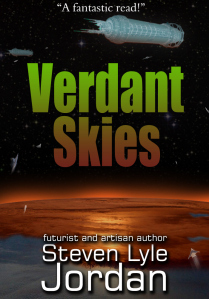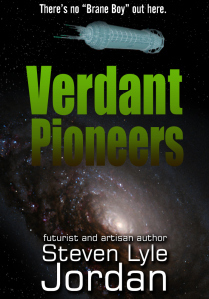Steven Lyle Jordan's Blog, page 48
May 4, 2014
Worldfarm One re-released
Worldfarm One has been re-released, with a new cover and...
May 2, 2014
Nod Gesture Control Ring
A new dimension in gesture control.
The new Nod gesture control ring ($150) has been designed to seamlessly transforms your hand movements into commands, allowing you to control devices and applications simply with a wave of your hand. In essence, the ring is an input device, just like a mouse, keyboard, or trackpad. Slip it on your index finger.
Wave your hand in the air. Swipe your thumb over its touch-control surface. All your gestures and motions can be used to control other consumer electronics. “We want you to be able to address any pixel of the digital world in the real world,” says Anush Elangovan, Nod Labs’ founder and CEO.
The $150 gesture-control ring is packed with an accelerometer, gyroscope, compass and temperature sensor. The ring’s chunky business end responds to capacitive touch. Battery life is rated for 24 hours. There are 12 different band sizes, and Nod is waterproof.
https://www.youtube.com/watch?v=dy-Ac9X9oSo&feature=youtu.be
View original 1 more word


May 1, 2014
Why can’t serious science fiction compete with this?
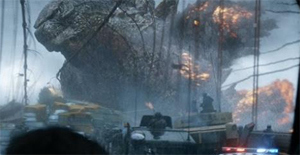 Sometimes, it just boggles my mind. I try to write serious, intelligent and thoughtful fiction with real science, believable characters and groundbreaking ideas. I believe there is a market for that kind of content. Yet, when I turn on the TV or go to the movies, I see boy wizards, vampires, monsters and superheroes. For every single movie like Solaris, we get the Marvel movie juggernaut. For every series like Person of Interest, we get a thousand variations of Jersey Shore. And, coming to a theatre near you: Godzilla. A creature that was silly when it was invented, based loosely on crap pseudo-science, fifty years ago.
Sometimes, it just boggles my mind. I try to write serious, intelligent and thoughtful fiction with real science, believable characters and groundbreaking ideas. I believe there is a market for that kind of content. Yet, when I turn on the TV or go to the movies, I see boy wizards, vampires, monsters and superheroes. For every single movie like Solaris, we get the Marvel movie juggernaut. For every series like Person of Interest, we get a thousand variations of Jersey Shore. And, coming to a theatre near you: Godzilla. A creature that was silly when it was invented, based loosely on crap pseudo-science, fifty years ago.
Is there really nothing about real, intelligent science that’s more compelling than all of this shlock?
I think about this a lot these days, whenever I work on a new novel or TV script: While I’m trying to produce intelligent material, I know that most people won’t read it… because there are no space battles, alien attackers, Chosen One teenagers with extraordinary powers or killer robots. I have to ask myself: Am I wasting my time with smart, futurist fiction? Should I just throw my brains out the window and write a story with talking cats and time travelers?
As much as I hate to admit it, sensationalist stories will always be popular stories… the honey that draws ‘em in like flies. Is that bad? Not really; it just is. But if you think about it one way… do you really want to compete with all that sensationalist content? Why not put a little effort in to being different?
I know my lack of popularity is not due to my content or quality, but my lack of effective promotion. If I created a sensationalist story, no one would find that either. So there’s no point in second-guessing my content; there’s only trying to find ways of getting it out there.
So go ahead… see Godzilla if you want. I don’t mind; after all, I expect to be on your radar pretty soon.


April 29, 2014
Five Common Problems I See In Your Stories
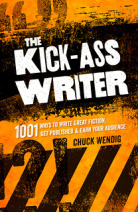 Chuck Wendig is a novelist, screenwriter and game designer. And in a recent opportunity to do blind critiques of various submitted manuscripts at the Pike’s Peak Writing Conference, he realized he could make a blog post of the five most common problems he finds in manuscripts. So he did. And I provide a link to it here.
Chuck Wendig is a novelist, screenwriter and game designer. And in a recent opportunity to do blind critiques of various submitted manuscripts at the Pike’s Peak Writing Conference, he realized he could make a blog post of the five most common problems he finds in manuscripts. So he did. And I provide a link to it here.
I agree that these are major points to consider in your writing process; as well as admitting that I don’t always hit them all as well as I should. If you’re a writer, you’d do well to take this lesson to heart. (Warning: Some language NSFW)


April 23, 2014
The Book Chums interview
April 22, 2014
The enemy
Score one for Earth Day
 Virginia’s top court has ruled against global warming skeptics trying to obtain emails written by climate scientist Michael Mann when he was a UVA professor. The judge stated that the emails are proprietary and exempt from FOIA requests — and that releasing them would impair academic “free thought and expression.”
Virginia’s top court has ruled against global warming skeptics trying to obtain emails written by climate scientist Michael Mann when he was a UVA professor. The judge stated that the emails are proprietary and exempt from FOIA requests — and that releasing them would impair academic “free thought and expression.”
Earth Day—1: Climate deniers—0.


April 20, 2014
The Awesome Con panel was a success
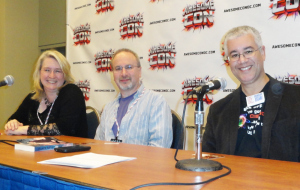
Gail Martin, Stuart Jaffe and myself at the Awesome Con panel “Are Heroes Getting Smaller?”
The Awesome Con gig went well yesterday. The panel subject, “Are Heroes Getting Smaller?” was moderated by Gail Z. Martin, fantasy author and originator of the panel’s subject. We were also joined by fantasy author Stuart Jaffe, with whom I’ve communicated before (on Facebook, I think). Yes, as the sci-fi author, I was pretty much the odd man out.
It’s a wonderful subject, and not just for the comic-book superhero crowd, as we demonstrated when we discussed. Heroes are products of their times. As times have changed, heroes have grown from the objects of childhood morality tales to influence (or, at least, entertain) adults as well. And since an adult’s world is much more complicated than a child’s—encompassing more grey areas of morality, as opposed to the more black and white world of a child’s morality—heroes have had to grow and develop to take that more complex world into consideration.
Also, heroes are products of culture. The cultures of old tended to be built around rather monolithic nations, where the majority of the public lived and died, were taught the same things, saw the same things and believed in the same things. Today’s cultures are more and more built around people from disparate cultures moving from place to place, creating a local mixture of beliefs, teachings and attitudes. This makes for a moral landscape that is much more complicated, forcing a hero to find solutions that distill as many of those beliefs as possible into a coherent form that most cultures will accept.
So heroes have had to adapt to this ever-more-complicated world in order to find relevance and still be able to lead us. They have also found themselves more closely compared to the world’s non-fictional heroes, the soldiers, police and emergency personnel we see every day, and who demonstrate their humanity even as they put themselves in harm’s way for us.
I had a chance to mention Captain America: The Winter Soldier, a very apt reference since Captain America, a World War II hero brought forward to the present day, was forced to deal with a time when values were very different from those of The Greatest Generation, and figure out how well he fit into that new world… at the same time that his comic book peers, and indeed his comic-reading audience, had to make the same determination for themselves.
Other comics heroes were discussed in relation to the subject, including the alien Superman, the “probable headcase” Batman, and the killer Wolverine… as well as the pulp detectives that brought the “shades of grey” hero to the fore in literature, and all the way back to the classic heroes, Hercules, Achilles, even Gilgamesh, whom, it bore reminding by an astute audience member, were just as flawed as today’s heroes, which made their deeds greater, and which is why we remember them at all.
Questions were asked after the panel, probably the best of which involved a long-running storyline in the Spider-Man comics, in which old enemy Otto “Dr. Octopus” Octavius has essentially taken over Spider-Man’s body, and believes he can be a superior Spider-Man, better than Peter Parker ever was. (SPOILER ALERT) In the end of the story arc, Octavius must shamefully accept that he is not as great a hero as Peter Parker; and when the time comes for a heroic deed that Octavius knows is beyond his ability, he returns to Peter control of his body, essentially, killing the last of himself, so a real hero can come forth.(/ALERT)
Personally, I was glad that one of us was familiar enough with the story arc to address it (namely, me… Gail and Stuart weren’t familiar with it), because the storyline overall was a great study on what it means to be a hero; especially the final lessons of the arc, including sacrifice for the greater good, and knowing your limitations, when it’s time to step out of the much-desired spotlight and let the professionals do their job.
I also mentioned the fact that I’ve written two books related to superheroes, including one that is presently out of circulation pending a much-needed update by myself. Midgard’s Militia‘s premise fascinated some of the audience, as I explained the premise: “The world’s superheroes have just been killed trying to stop a monster before it could reach the Earth; what do regular people do now, with a monster still approaching and no superheroes to save them?” The story examined the efforts regular people would go to to protect their homes, prove them as great as any super-powered hero, and ultimately save the day. Judging by the response, I think I need to fast-track that book back into circulation. For the sake of the fans, of course.
Probably the only thing that I didn’t get to say was that heroes have indeed gotten smaller… just because, thanks to our culture’s love of heroes and our entertainment industry’s desire to provide more products for our enjoyment… there are so damned many of them…
At the end of the panel, we received applause, a few fleeting comments at the end, and business cards magically disappeared from the table. I spoke to a friend of mine who sat in on the panel, and when I asked, “How do you think I did?” she beamed and responded to me: “You didn’t embarrass us!”
Although I would’ve preferred a more science fiction venue (Awesome Con is primarily a comic book convention), I was happy with the way things worked out, and definitely look forward to doing that again some time.


April 17, 2014
New Verdant covers
Have a gander at the latest covers for Verdant Skies and Verdant Pioneers, both available on re-released novels, which also include updated contact information.
Know anyone looking for exciting futurist fiction? Now you know what to show them.







 Originally posted on
Originally posted on 







